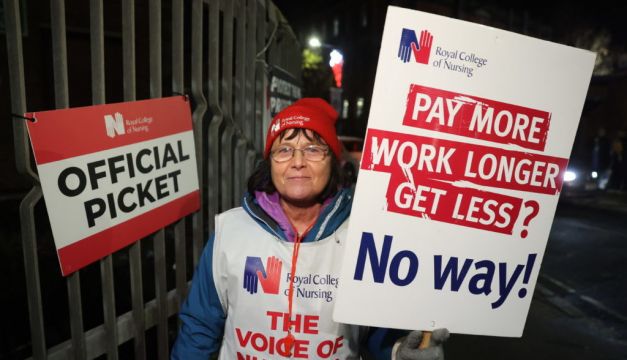Thousands of health workers are taking part in strike action across Northern Ireland.
Paramedics are among the workers taking part at picket lines across the region on Thursday.
Workers with the unions Nipsa, Unison, Unite and the GMB are staging the action.
The 24-hour stoppage will be the latest full day of action taken by health sector unions as they press for safe staffing, better pay and improved mileage allowances.
There was previous strike action on December 12th.
The Royal College of Nursing also took part in strike action over pay and safe staffing levels in December.
Anne Speed, of Unison, said in the absence of talks, workers are “stepping out and stepping up”.
“It is an appalling situation when trade unions willing to negotiate have all doors closed to them. It is therefore inevitable that this action today is happening,” she said.
“Health workers cannot stand idly by or stay silent. And why should they?”
Ms Speed also lambasted Secretary of State Chris Heaton-Harris, who is currently on a trip to the United States aimed at encouraging trade opportunities.
The Stormont Assembly remains in flux with no ministers in post.
Ms Speed said Mr Heaton-Harris has responsibilities in Northern Ireland.
“It is time he included in his priorities addressing the crisis in our health service. Staff recruitment and retention and pay justice are every bit as important as trade,” she said.
“Our members also expect a joint effort from all political parties to break this logjam.”
In a statement, the Northern Ireland Ambulance Service (NIAS) said it has engaged with trade union representatives to identify services and roles that will be exempt from strike action to ensure that a response continues to the most clinically urgent patients.
However, NIAS said it anticipates challenges throughout Thursday and that it plans to maintain the safety of those patients whose need is greatest.
It has urged the public to only call for an ambulance on Thursday in life-threatening emergencies such as cardiac arrest, loss of consciousness, breathing difficulties, severe bleeding and others.

“Callers should not hesitate to call 999 in the case of serious illness or injury, but other callers should consider other options including self-care, seeking GP or pharmacy advice or presenting themselves to Emergency Departments,” the service said.
The spokesman added: “NIAS respects the right of our staff who are union members to participate in industrial action.
“This action is being taken in relation to the national issues of pay and conditions and is a matter for the Government and trade unions.”







